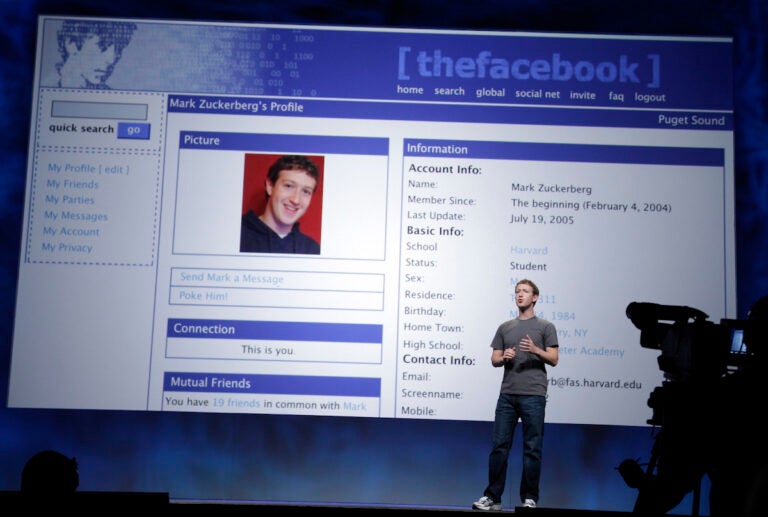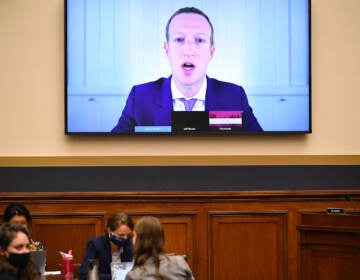Facebook, a computing pioneer, a secret government program, and a strange coincidence
How one man’s quest to remember everything helped usher in a new era.
Listen 8:54
Facebook CEO Mark Zuckerberg talks about an old Facebook web site during the F8 conference in San Francisco.(AP Photo/Paul Sakuma, File)
This story is from The Pulse, a weekly health and science podcast.
Find it on Apple Podcasts, Spotify, or wherever you get your podcasts.
Facebook’s origin story has been told again and again — 20 years ago a group of ambitious Harvard sophomores created the site from their dorm room that would soon go on to change the world.
But in certain corners of the internet, there is a different take on how it all started.
One that riffs on the timing of the company’s launch date, February 4, 2004, and the shutdown of a secretive, now-defunct, government program.
Central to this story is the research of Chester Gordon Bell, one of the architects of the modern internet.
“I’ll say I’m one of the computing pioneers,” Bell said, summing up his decades-long career in the field.
It all started back in 1997, when a former colleague from Carnegie Mellon University asked Bell if he could scan all of his books and documents into an archive about computer science history.
The request gave Bell an idea. Why stop there?
“He said, ‘Why don’t I see what it’s like if you scanned everything in your life and put it online.’”
Bell wanted to capture the type of data that would have previously been impossible to collect without the kind of emerging technology finally at his disposal.
He brought the idea to Microsoft and hired an assistant.
“And we started scanning, scanning everything,” Bell said.
Emails, work notes, his online browsing history.
Bell eventually started wearing a camera around his neck that regularly snapped photos on a timer, an altimeter, and a GPS receiver that tracked his location.
The idea was to create a “surrogate memory” — a trove of stored data to supplement the flawed recall of his human mind.
“It’s really how I can go back and pinpoint something,” Bell said.
Subscribe to The Pulse
In 2002, Bell and his team wrote a paper about his experience organizing human life, and all this new data, electronically in a coherent, searchable way.
“The main kind of display line that I like to think of is really a timeline. I mean, I love timelines,” Bell said.
What seems obvious now was anything but then. He was blazing a new frontier.
His team estimated that, without video, an 80-year-old could jam all their data into just a terabyte of storage. A lifetime of memories on a thumb drive in your pocket.
It wasn’t long before others began to notice what his team was doing – blending computing with cameras, sensors, and memories.
The practice became known as ”lifelogging.” And soon, the U.S. military came calling.
Specifically, the Defense Advanced Research Projects Agency — or DARPA. The agency is responsible for developing innovative and often secret technology for the U.S. military.
“We talked about what they could do in the project,” Bell said.
In 2003, building off Bell’s research, DARPA sought proposals to develop its own LifeLog program to investigate potential military applications for this new form of memory collection, storage, and organization.
Bell said he discussed his ideas about lifelogging with Google Glass-developer Thad Starner, who later conducted DARPA-funded research on body-worn sensors for soldiers.
“He couldn’t tell us exactly all the things it was doing, but troops would wear it and go out on patrol and kind of gather information about different sites and things like that,” Bell said.
Researchers at DARPA believed that the library of data gathered via lifelogging could be fed into AI models to predict human decision-making.
But word got out about DARPA’s interest at a bad time.
“And then it became kind of a hot potato,” Bell said.
Privacy advocates and lawmakers worried the program would be used for reasons other than tracking troop locations. How long until all American lives were logged and analyzed?
After the 9/11 terrorist attacks, clandestine surveillance programs were being uncovered and stomped out left and right.
One of those programs was called Total Information Awareness. Its existence was revealed by the New York Times in 2002.
During a confirmation hearing in 2003, the late senator Carl Levin described Total Information Awareness as “a program to develop and integrate information technologies, enabling the intelligence community to sift through multiple databases, sources, passports, visas, work permits, driver’s license, credit card transactions, airline tickets, car rentals, gun purchases to detect and classify and to identify potential terrorist activities, which is fine. But the potential for the invasion of privacy in the lives of ordinary citizens is huge.”
The program’s description was comically menacing – the vision of a ”virtual, centralized, grand database” on the actions of countless Americans and foreign nationals. Even the program’s logo seemed ripped out from some conspiracy theory fever dream: the image of an all-knowing eye atop a pyramid gazing on the world.
It caused major concerns about civil liberties.
If these tools fell into the wrong hands, say into those of a president-turned-dictator, things could go south very quickly.
So, in 2003, Congress canceled the Total Information Awareness program.
And the whole issue also cast shade on DARPA’s LifeLog program, which now seemed like just another excuse to pry.
“The senators and whoever looked at it and said, ‘Oh, we can’t be doing this surveillance stuff’,” Bell said.
The creator of DARPA’s Lifelog program later told Vice News that the research had nothing to do with spying.
But it was too late.
On February 4, 2004, DARPA shut down LifeLog.
It was the very same day that a skinny college student named Mark Zuckerberg officially launched a new website called The Facebook.
As you might have guessed, this is part of the story where all the speculation starts — when forum board authors start typing in all caps and Youtubers add dramatic music.
It sounds like something your weird uncle might post on Facebook.
Timing the official shuttering of a very controversial research program exactly with the start of a front company meant to keep said ostensibly-defunct-research-program secretly operational doesn’t seem like a very smart idea.
But, there are some potential tenuous connections. Following the creation of In-Q-Tel, a venture capital fund created by the Central Intelligence Agency, the U.S. intelligence community has become a big investor in Silicon Valley firms that mine data collected by Facebook and other social media sites – an influential relationship some technology companies publicly celebrate.
Facebook’s first big outside investor, Peter Theil, has long enjoyed a cozy relationship with American spy agencies.
But to be clear, there is no evidence DARPA or the U.S. intelligence services had any role in the creation of Facebook. Nor is there evidence that intelligence agencies have directly invested in the company.
I reached out to Meta to ask about their response to the suspicions around the LifeLog program.
A spokesperson told me it was the first time he had ever been asked about it and then declined to comment.
Chester Gordon Bell said it’s no surprise that so many people were interested in lifelogging back in the early 2000s.
Memories weren’t just valuable to those who created them. These moments contained an untapped resource: fungible data that could be bought, sold, analyzed, or tracked.
“In fact, I had a meeting at Facebook, a long time ago, very early with them. And I said, ‘Well, one of the things you should do is make your timeline,” Bell said.
Bell could not remember the exact date of his discussions with this team at Facebook, but he said the talk focused on memory-keeping rather than lifelogging’s potential social implications.
Meta did not provide any additional details about the meeting.
As for canceled government programs, computer scientist and former DARPA researcher Newton Lee believes there’s no need to speculate about Facebook’s origin — rather, take a look at what it’s become, and how it’s being used.
He argues that the platform remains an indispensable tool for law enforcement and intelligence agencies — keeping the dream of Total Information Awareness alive.
“Sure the program was canceled, but the idea still lingers, right?” Lee said.
Lee is the author of “Facebook Nation”, one book in a trilogy on the concept of Total Information Awareness.
With the help of social media sites like Facebook, Lee said the long-fabled “all-knowing database” has essentially arrived. With much of its information volunteered by users and made available without a warrant.
“Legal entities such as the FBI can actually piece together your entire life,” he said. Lee graduated from the FBI Citizens Academy in 2021.
Just like the internet, Chester Gordon Bell knew lifelogging would revolutionize society and what it means to be human.
But today at 89 years old, Bell can’t recall the last time he looked through his surrogate memory. His old photos have mostly become screensavers.
“People say what’s a good app [for lifelogging]? Screen saver,” Bell said. Yet the cameras and sensors keep getting smaller and cheaper and more accurate — capturing, uploading, and organizing every little detail of life inside this world Bell helped build.
In 2020, Meta, the company behind Facebook, unveiled a new product: smart glasses with built-in cameras.
Bell insists the benefits of the technology outweigh the drawbacks. Like the watch monitoring his heartbeat.
“The fact that somebody else has got, a copy of this somewhere, and are looking at it, it’s personally not bothering me at all.”
WHYY is your source for fact-based, in-depth journalism and information. As a nonprofit organization, we rely on financial support from readers like you. Please give today.







